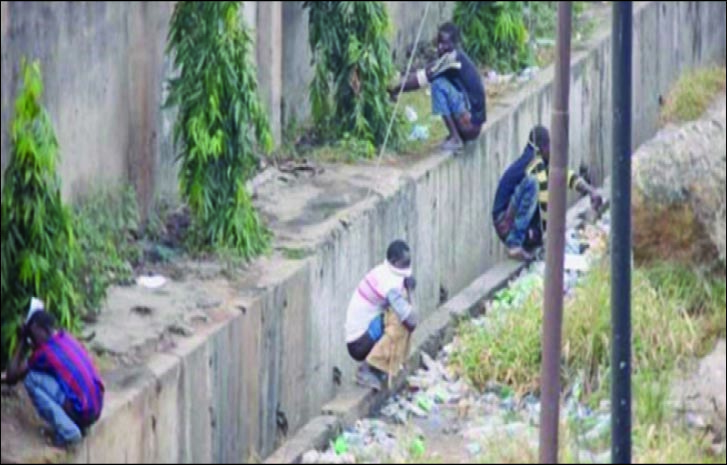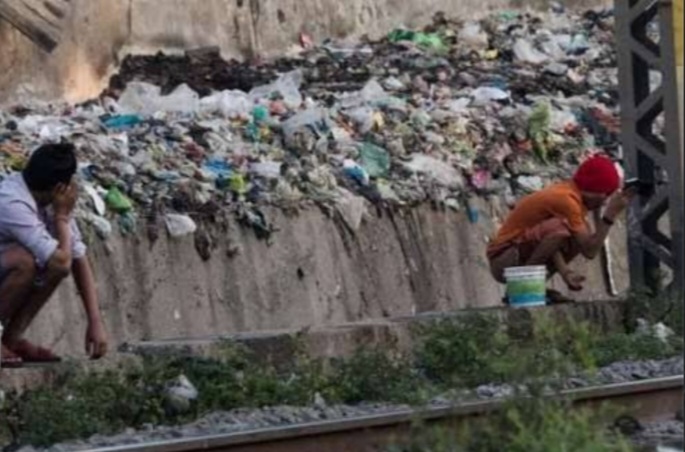FCTA, 19 States Hold Down Nigeria on Open Defecation Free Target

By George George Idowu
With barely six years for Nigeria to attain the status of Open Defecation Free (ODF), there are growing concerns that the Federal Capital Territory Administration (FCTA) and 19 States will make Africa’s most populous country miss the global 2030 target.
The open defecation free target falls within the 6th Sustainable Development Goal (SDG 6) of the United Nations, to which Nigeria had pledged commitment.
NatureNews reports that Nigeria’s performance is prorated on the 774 Local Government Areas recognised by the Constitution of the Federal Republic, which are spread across the 36 states and the Federal Capital Territory, Abuja.
The Minister of Water Resources and Sanitation, Prof. Joseph Utsev recently disclosed that 117 LGAs in Nigeria have been certified as open defecation free.
However, NatureNews investigation reveals that despite the latest 117 figures on the certified LGAs, Nigeria has only achieved an abysmal 15.1% of the ODF target as 657 or 84.9% of the LGAs are still uncertified.

Checks by NatureNews shows that 19 of Nigeria’s 36 states and the Federal Capital Territory, Abuja, that have not recorded any ODF LGA, are responsible for dragging the country down on target achievement.
The 19 states are spread across the country’s six geopolitical zones, which are North Central, South South, North East, South West, North West, and South East.
The worst performing geopolitical zone, North Central, has five laggard states which are Kogi, Kwara, Nasarawa, Niger, Plateau, and the FCT Abuja, while the poorly rated states in the South West are Ekiti, Lagos, Ondo, and Oyo states.
Both the North East and South East regions have Adamawa, Gombe, and Taraba; and Abia, Ebonyi, and Enugu states.
The fairer regions, the North West and South South, have two low performing states each, namely, Kebbi and Sokoto; Edo and Rivers, respectively.
NatureNews had reported in 2021 optimism expressed by the then Vice President of Nigeria, Professor Yemi Osinbajo, that “if we work conscientiously, we can really make our country open defecation free by 2025”.
Said he: “It is entirely possible, and we must not rest on our oars as we push for the delivery of sustainable sanitation and hygiene services for all Nigerians. We are at the cusp of real acceleration if we seize the current momentum.
“So, it is time to align our efforts at all levels and commit ourselves to using all of our spheres of influence in advancing the objectives of the campaign.”
NatureNews also recalled that the then Minister of Water Resources, Engr. Suleiman Adamu launched several initiatives to ensure Nigeria was free from the scourge of open defecation.
The Minister, during whose tenure the bulk of the certifications was achieved, launched the Clean Nigeria programme headed by a National Coordinator, Mrs Chizoma Opara, and also got a whole state, Jigawa, certified as ODF.
While Engr Adamu has been credited with expending the coverage of ODF campaign from 19 to 36 states of the federation and the FCT, analysts believe stakeholders at the sub-national levels are responsible for the low national performance on target.
Other stakeholders have expressed concerns about the lack of proper harmonisation of the campaigns being undertaken by various stakeholders, especially the national and states’ communication strategies.
“By now, the country should have moved far beyond the current achievement of 117 LGAs, said a source, who noted that from 2020 to date, only 79 LGAs had been added to the 38 earlier declared as ODF.
Analysts are worried that the nation has yet to akin to the valedictory insights shared by the former Minister of Water Resources, Engr. Suleiman Adamu, when he insisted that all stakeholders must take the Open Defecation-Free (ODF) campaign to grassroots.
According to him, the current efforts to rid Nigeria of open defecation will gain more momentum when they are community-based and passed through traditional communication channels.
“The ODF message must be community based and people centred, this will make current efforts have lasting impact”, said Engr. Adamu.

NatureNews reports that the Minister’s perspective resonated with the United Nations Children’s Fund, (UNICEF) that has urged the Nigerian government to intensify her fight against open defecation by allocating at least 1.3 percent of the annual national budget to Water, Sanitation and Hygiene (WASH).
Investigation by NatureNews reveals that the recent fiscal budget for 2024 signed by President Bola Ahmed Tinubu still reflects the underfunding of the Ministry of Water Resources and Sanitation.
”To achieve the WASH SDGs target in Nigeria by 2030, the government needed to invest an estimated 1.3 per cent of its annual GDP, which is about N1.9 trillion”, said UNICEF document, which noted that “Children under the age of five that die currently in Nigeria are linked to unsafe water and sanitation”.
While a state is often treated as an independent level of government, NatureNews reports that Abuja, the seat of Federal Government of Nigeria, is also performing poorly on the ODF target.
This is despite the realisation that the six area councils of FCT belong to the topmost 25 LGAs in Nigeria that are getting huge allocation from the Federation Account.
This calls to question the appropriation of allocated funds and the expenditure patterns of the area councils in FCT.
Meanwhile, the 17 states that are making progress on ODF campaign have been commended by the Minister of Water Resources and Sanitation, Prof Joseph Utsev as he celebrated the achievement of 117 ODF LGAs in Nigeria.
According to the Minister, Jigawa still led the pack with 27 LGAs that are free from open defecation, Anambra with 3, Bauchi with 7, Katsina with 27, and Kano with 18.
Others are Benue State with 9, Borno has 2, Cross River has 6, Zamfara with 3, while Akwa-Ibom, Osun, Yobe, and Imo have 1 LGAs respectively.
This report was supported by Climate Africa Media Initiative & Centre (CAMIC)
